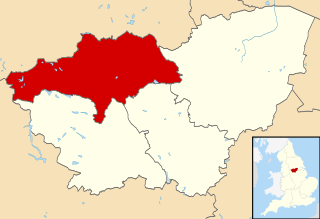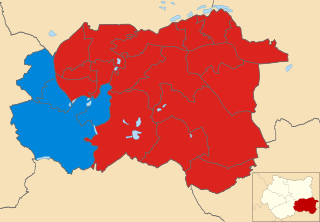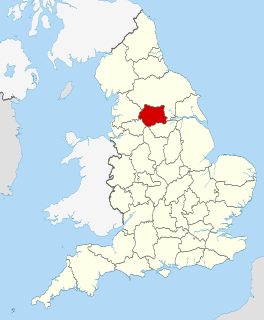
The City of Wakefield is a local government district in West Yorkshire, England, with the status of a city and metropolitan borough. Wakefield is the district's administrative centre. The population of the City of Wakefield at the 2011 Census was 325,837. The district includes the "Five Towns" of Normanton, Pontefract, Featherstone, Castleford and Knottingley. Other towns include Ossett, Hemsworth, South Kirkby and Moorthorpe and South Elmsall. The City and borough are governed by Wakefield Metropolitan District Council. Wakefield lies between Leeds and Barnsley

The Metropolitan Borough of Barnsley is a metropolitan borough of South Yorkshire, England; its main town is Barnsley.
One third of Wakefield Metropolitan District Council in West Yorkshire, England is elected each year for 3 years, followed by one year without an election. 63 councillors are elected with 3 from each of the 21 wards.
The 1998 Wakefield Metropolitan District Council election took place on 7 May 1998 to elect members of Wakefield Metropolitan District Council in West Yorkshire, England. One-third of the council was up for election and the Labour party kept overall control of the council.

The City of Leeds ( ) is a local government district of West Yorkshire, England, governed by Leeds City Council, with the status of a city and metropolitan borough. The metropolitan district includes the administrative centre Leeds and the ten towns of Farsley, Garforth, Guiseley, Horsforth, Morley, Otley, Pudsey, Rothwell, Wetherby and Yeadon. It has a population of 784,800 (mid-2017 est.), making it technically the second largest city in England by population behind Birmingham; it is also the second largest metropolitan district by area behind Doncaster.
The 1999 Wakefield Metropolitan District Council election took place on 6 May 1999 to elect members of Wakefield Metropolitan District Council in West Yorkshire, England. One third of the council was up for election and the Labour party kept overall control of the council.
The 2000 Wakefield Metropolitan District Council election took place on 4 May 2000 to elect members of Wakefield Metropolitan District Council in West Yorkshire, England. One third of the council was up for election and the Labour party kept overall control of the council.
The 2002 Wakefield Metropolitan District Council election took place on 2 May 2002 to elect members of Wakefield Metropolitan District Council in West Yorkshire, England. One third of the council was up for election and the Labour party kept overall control of the council.
The 2003 Wakefield Metropolitan District Council election took place on 1 May 2003 to elect members of Wakefield Metropolitan District Council in West Yorkshire, England. One third of the council was up for election and the Labour party kept overall control of the council.
The 2004 Wakefield Metropolitan District Council election took place on 10 June 2004 to elect members of Wakefield Metropolitan District Council in West Yorkshire, England. The whole council was up for election with boundary changes since the last election in 2003. The Labour party stayed in overall control of the council.

The 2006 Wakefield Metropolitan District Council election took place on 4 May 2006 to elect members of Wakefield Metropolitan District Council in West Yorkshire, England. One third of the council was up for election and the Labour party kept overall control of the council.

The 2007 Wakefield Metropolitan District Council election took place on 3 May 2007 to elect members of Wakefield Metropolitan District Council in West Yorkshire, England. One third of the council was up for election and the Labour party kept overall control of the council.

The 2008 Wakefield Metropolitan District Council election took place on 1 May 2008 to elect members of Wakefield Metropolitan District Council in West Yorkshire, England. One third of the council was up for election and the Labour party stayed in overall control of the council.

The 2011 Wakefield Metropolitan District Council election took place on 5 May 2011 to elect members of Wakefield Metropolitan District Council in West Yorkshire, England. One third of the council was up for election and the Labour party stayed in overall control of the council with an increased majority. After the election, the composition of the council was:

West Yorkshire County Council (WYCC) — also known as West Yorkshire Metropolitan County Council (WYMCC) — was the top-tier local government administrative body for West Yorkshire from 1974 to 1986. A strategic authority, with responsibilities for public transport, planning, emergency services and waste disposal, it was composed of 88 members drawn from the five metropolitan boroughs of West Yorkshire. West Yorkshire County Council shared power with five lower-tier district councils, each of which directed local matters.

Pontefract South is an electoral ward of the City of Wakefield district used for elections to Wakefield Metropolitan District Council.

Wakefield Council, also known as Wakefield Metropolitan District Council is the local authority of the City of Wakefield in West Yorkshire, England. It is a metropolitan district council and provides a full range of local government services including Council Tax billing, libraries, social services, processing planning applications, waste collection and disposal, and it is a local education authority. Wakefield is divided into 21 wards, electing 63 councillors. A third of the council is elected for three of every four years. The council was created by the Local Government Act 1972 and replaced the Wakefield City Council of the County Borough of Wakefield and several other authorities. Since 1974 Wakefield has held borough and city status and from this time would use the full title of the authority on all publications, signage, council vehicle fleet and documents, however from around 2005, like many other local authorities doing so at the time, the authority dropped the full title for the shorter Wakefield Council.

The 2015 Wakefield Metropolitan District Council election took place on 7 May 2015 to elect members of Wakefield Metropolitan District Council in England. This was on the same day as other local elections. The Labour Party and Conservatives fielded a full slate of 21 candidates, with UKIP putting forward 17 candidates. There were 9 Green candidates, 9 TUSC candidates and 6 Liberal Democrat candidates. Also standing were 2 Yorkshire First representatives, and one Independent.

The 2016 Wakefield Metropolitan Borough Council election took place on 5 May 2016 to elect members of Wakefield Metropolitan District Council in England. This was on the same day as other local elections. The Labour Party and the Conservative Party fielded a full slate of 21 candidates, with UK Independence Party putting forward 11 candidates, 9 Liberal Democrat candidates, 6 Trade Union and Socialist Coalition candidates, 5 Yorkshire First candidates, 3 Green Party candidates and 4 Independent candidates.

The 2018 Wakefield Metropolitan Borough Council election will take place on 3 May 2018 to elect members of Wakefield Metropolitan District Council in England. This will be on the same day as other local elections. The Labour Party and the Conservative Party are fielding a full slate of 21 candidates, as well as 12 Liberal Democrats, 6 Yorkshire Party candidates, 4 Green Party candidates, 3 UK Independence Party candidates, 1 Trade Unionist and Socialist Coalition candidate and 1 Democrats and Veteran's Party candidate.
















